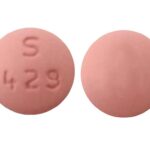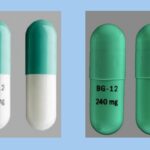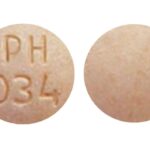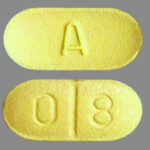IP 253 Pill: Uses, Dosage, Side Effects, Interactions

The orange, round pill with the imprint IP 253 has been identified as Ranitidine Hydrochloride 150 mg supplied by Amneal Pharmaceuticals. Ranitidine belongs to the class of medications called H2-antagonists. IP 253 pill is used to reduce the amount of acid secreted by the stomach in order to reduce ulcer and heartburn pain or to assist in healing of ulcers. It is used to treat stomach and duodenal (intestinal) ulcers, and prevent them from recurring. It is also used to treat gastroesophageal reflux disease (GERD) and Zollinger-Ellison Syndrome.
How should I take IP 253 pill?
The recommended adult dose of ranitidine ranges from 150 mg daily to 150 mg twice daily or 300 mg once daily depending on the condition being treated. Ranitidine may be taken with or without food.
When used over-the-counter to treat acid indigestion, heartburn, or sour or upset stomach, the usual dose for adults and children 16 years of age or older is 75 mg to 150 mg taken when symptoms appear. If symptoms persist for more than 1 hour or return after 1 hour, you may take a second dose of the same strength. To prevent symptoms brought on by consuming food or beverages, take the dose 30 to 60 minutes before eating food or drinking beverages that are expected to cause symptoms. The maximum dose is 300 mg every 24 hours. Do not take it in this manner for more than 2 weeks without seeking medical.
Many things can affect the dose of medication that a person needs, such as body weight, other medical conditions, and other medications. If your doctor has recommended a dose different from the ones listed here, do not change the way that you are taking the medication without consulting your doctor.
It is important to take this medication exactly as prescribed by your doctor. If you miss a dose, take it as soon as possible and continue with your regular schedule. If it is almost time for your next dose, skip the missed dose and continue with your regular dosing schedule. Do not take a double dose to make up for a missed one. If you are not sure what to do after missing a dose, contact your doctor or pharmacist for advice.
Store the tablets at room temperature, protect them from light and moisture, and keep them out of the reach of children.
Who should NOT take this medication?
Do not take this medication if you:
• are allergic to ranitidine or any ingredients of the medication
• are allergic to any other H2-antagonist (e.g., cimetidine, famotidine)
What are the side effects of IP 253 pill?
The following side effects have been reported by at least 1% of people taking IP 253 pill. Many of these side effects can be managed, and some may go away on their own over time.
Contact your doctor if you experience these side effects and they are severe or bothersome. Your pharmacist may be able to advise you on managing side effects.
• changed sense of taste
• constipation
• diarrhea
• dizziness
• drowsiness
• dry mouth
• headache
• muscle or joint pain
• nausea
• trouble sleeping
• vomiting
• weakness
Although most of these side effects listed below don’t happen very often, they could lead to serious problems if you do not seek medical attention.
Check with your doctor as soon as possible if any of the following side effects occur:
• blurred vision
• breast development (males)
• change of heartbeat (faster, slower, or irregular)
• confusion
• decreased sexual ability
• hair loss
• hallucination (hearing or seeing things that aren’t there)
• increased frequency of infections
• signs of clotting problems (e.g., unusual nosebleeds, bruising, blood in urine, coughing blood, bleeding gums, cuts that don’t stop bleeding)
• signs of depression (e.g., poor concentration, changes in weight, changes in sleep, decreased interest in activities, thoughts of suicide)
• signs of kidney problems (e.g., increased urination at night, decreased urine production, blood in the urine)
• signs of liver problems (e.g., nausea, vomiting, diarrhea, loss of appetite, weight loss, yellowing of the skin or whites of the eyes, dark urine, pale stools)
• skin rash or hives
• stomach pain
Stop taking the medication and seek immediate medical attention if any of the following occur:
• signs of pancreatitis (e.g., abdominal pain on the upper left side, back pain, nausea, fever, chills, rapid heartbeat, swollen abdomen)
• signs of a serious allergic reaction (e.g., abdominal cramps, difficulty breathing, nausea and vomiting, or swelling of the face and throat)
• signs of a severe skin reaction such as blistering, peeling, a rash covering a large area of the body, a rash that spreads quickly, or a rash combined with fever or discomfort
Some people may experience side effects other than those listed. Check with your doctor if you notice any symptom that worries you while you are taking this medication.
Are there any other precautions or warnings for this medication?
Before you begin using a medication, be sure to inform your doctor of any medical conditions or allergies you may have, any medications you are taking, whether you are pregnant or breast-feeding, and any other significant facts about your health. These factors may affect how you should use this medication.
Kidney function: Kidney disease or reduced kidney function may cause this medication to build up in the body, causing side effects. If you have reduced kidney function or kidney disease, discuss with your doctor how this medication may affect your medical condition, how your medical condition may affect the dosing and effectiveness of this medication, and whether any special monitoring is needed.
Pneumonia: People with lung disease, a weak immune system, or diabetes may be at an increased risk of developing pneumonia while taking ranitidine. If you have any of these conditions, discuss with your doctor how this medication may affect your medical condition, how your medical condition may affect the dosing and effectiveness of this medication, and whether any special monitoring is needed.
Porphyria: IP 253 pill may cause attacks of a condition called acute porphyria (a disorder that affects the production of heme in the body). People with a history of acute porphyria should not take ranitidine.
Stomach cancer: Using medications such as IP 253 pill may prevent symptoms of stomach cancer from being noticed. If you have recurrent vomiting, difficulty swallowing, blood in the stool, significant unintentional weight loss, fatigue (anemia), or are coughing up blood, check with your doctor right away. If you have heartburn that worsens or returns after using this medication continuously for 2 weeks, check with your doctor.
Use with NSAIDs: If you are also taking non-steroidal anti-inflammatory drugs (NSAIDs; e.g., diclofenac, ibuprofen, naproxen), your doctor should closely monitor your condition, especially if you are a senior or have a history of ulcers.
Pregnancy: IP 253 pill should not be used during pregnancy unless the benefits outweigh the risks. If you become pregnant while taking this medication, contact your doctor immediately.
Breast-feeding: This medication passes into breast milk. If you are a breast-feeding mother and are taking IP 253 pill, it may affect your baby. Talk to your doctor about whether you should continue breast-feeding.
Children: The safety and effectiveness of using IP 253 pill have not been established for children less than 8 years of age. Children between the ages of 8 years and 16 years of age, should only use this medication under the supervision of a doctor.
Seniors: Seniors may be more likely to experience interactions with other medications when taking ranitidine. If you are a senior, your doctor should closely monitor your condition.
What other drugs could interact with IP 253 pill?
There may be an interaction between ranitidine and any of the following:
• antacids (e.g., magnesium hydroxide, calcium carbonate; within 2 hours of taking ranitidine)
• “azole” antifungals (e.g., itraconazole, ketoconazole, posaconazole)
• cefuroxime
• clavulanic acid
• cyclosporine
• delavirdine
• dexmethylphenidate
• diltiazem
• dronedarone
• fluvastatin
• glyburide
• HIV protease inhibitors (e.g., darunavir, indinavir, lopinavir, saquinavir, tipranavir)
• iron salts (e.g., ferrous fumarate, ferrous gluconate, ferrous sulfate)
• ledipasvir
• lumacaftor
• mesalamine
• methylphenidate
• midazolam
• pentoxifylline
• prasugrel
• procainamide
• protein kinase inhibitors (e.g., bosutinib, dabrafenib, dasatinib, nilotinib, pazopanib)
• quinidine
• quinine
• rilpivirine
• risedronate
• St. John’s wort
• sucralfate
• tacrolimus
• varenicline
• velpatasvir
• verapamil
• warfarin
If you are taking any of these medications, speak with your doctor or pharmacist. Depending on your specific circumstances, your doctor may want you to:
• stop taking one of the medications,
• change one of the medications to another,
• change how you are taking one or both of the medications, or
• leave everything as is.
An interaction between two medications does not always mean that you must stop taking one of them. Speak to your doctor about how any drug interactions are being managed or should be managed.
Medications other than those listed above may interact with this medication. Tell your doctor or prescriber about all prescription, over-the-counter (non-prescription), and herbal medications you are taking. Also tell them about any supplements you take. Since caffeine, alcohol, the nicotine from cigarettes, or street drugs can affect the action of many medications, you should let your prescriber know if you use them.





